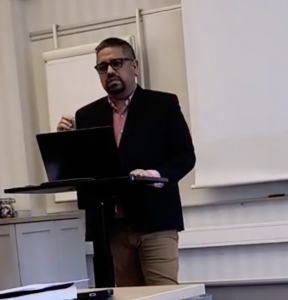Gilles Deleuze – 100. Thinking is an Event
Gilles Deleuze (1925–1995) understood philosophy not as a form of knowledge, but as a creative act – the art of concept creation, a form of thought that affirms life in its most vital intensity. For him, philosophy was not the interpretation of texts or logical classification, but the revitalisation of thinking beyond representational hierarchies – plastic, affective, experimental, nomadic, minoritarian, and critical.
Distancing himself from the philosophical trends of his time (phenomenology, structuralism, Marxism, etc.), Deleuze found allies within the history of philosophy (Bergson, Nietzsche, Spinoza, among others), transforming thought into a force that both invites, provokes, and disturbs – forging a counter-current. The seriousness of this philosophy is not dogmatic; it is a tension that opens up heterogeneous fields of becoming and demands an intensity of co-thinking.
The conference is conceived as an event – a making of sense – that invites us to think with Deleuze, to revisit the familiar and encounter the paradoxical; not so much to interpret, but to experiment – to uncover “logics” emerging in the domains of image, affect, and cinematic space-time, that re-examine dominant currents of thought. To think is to enter a process of becoming, and to affirm multiplicity and sense.
Programma_Delezam100_
| Talk: | Reframing Masochism: Deleuze, Žižek, and the Dynamics of Power |
| Length: | 25′ (on line) |
| Abstract: | Since its initial emergence within the sphere of medical discourse, the concept of masochism has predominantly been regarded as a form of sexual perversion, a perception partly influenced by Leopold von Sacher-Masoch’s provocative novel, “Venus in Furs.” This literary work significantly shaped early understandings of masochistic tendencies. However, Gilles Deleuze’s seminal text, “Masochism: Coldness and Cruelty,” offers a more nuanced perspective, emphasising masochism’s intrinsic focus on meticulously structured contracts, defined rules, and the deliberate eroticisation of controlled pain. This stands in stark contrast to sadism, which Deleuze characterises by its anarchic impulses, unrestrained desires, and the overt infliction of pain. Through this dichotomy, Deleuze extends the conceptual boundaries of masochism beyond the traditional psychoanalytic framework.
The principal objective of this article is to thoughtfully recast Deleuze’s profound insights on masochism, juxtaposing them with the theoretical contributions of Slavoj Žižek. In undertaking this comparative analysis, we aim to elucidate how Deleuze’s distinctive approach may have laid a foundational framework for understanding complex power dynamics through the theoretical lens of masochism. I contend that, although the passing of the French philosopher makes any direct intellectual debate with Žižek impossible, the centenary of Deleuze’s birth presents a timely and meaningful opportunity. This occasion encourages us to critically examine and reflect on the enduring influence and profound impact of Deleuze’s philosophical contributions within the nuanced and intricate realms of political theory and discourse. |
| Dates: | 8–10 Oct 2025 |
Arevalo_Deleuze100-27

